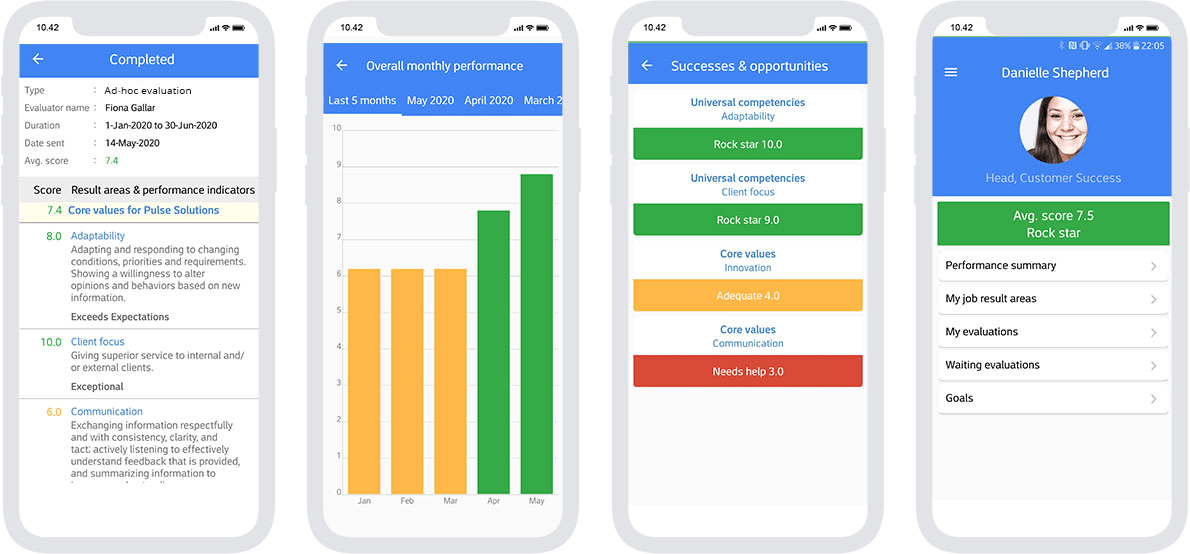Employee engagement has been a hot topic among HR professionals for some time, but what exactly does that mean? As business managers, do we pursue employee engagement for the sole purpose of having engaged employees? The short answer is no. Having happy employees is a great thing, but it is not a measurement that trends towards better performance. Without measurable outcomes, engagements like employee happiness becomes more of an unpredictable cesspool of unreliable feedback. Smart businesses understand that targeting higher employee engagement is a big contributor to better business performance.
A recent report by LinkedIn shows that in a post-pandemic world, 64% of learning and development professionals believe they must retrain their workforce to fill in skill gaps and is a major priority for their organization. As a matter of fact, various Fortune 500 companies have recognized that employee development is one of the key factors in organizational development.
What Is Employee Engagement?
Employee engagement refers to the level of participation, commitment, and emotional connection an employee has with their job and the organization as a whole. Engaged employees are passionate about their work, feel valued, and are motivated to give their best in contributing to the organization’s success.
How engaged an employee feels can depend on several factors including organizational leadership, culture, recognition and rewards, communication, and opportunities for growth and development. By implementing effective employee engagement strategies, engaged employees exhibit higher levels of productivity, creativity, and innovation, and lower levels of employee turnover and absenteeism. Overall organizational performance is better when job satisfaction is higher due to a positive work environment.
Why Is Employee Engagement Important?
Labor shortages in recent years have forced organizations to rethink the employer/employee relationships within their workforce. The shift must be made from “What can our employees do for us?” to “How can we help our employees succeed in order to reach our company goals?”. Organizations today must be innovative, flexible, and proactive in meeting the requirements of those they employ. Great leadership is at the heart of this mindset shift, and is an area in which organizations need to place strong emphasis.
Organizational leadership must learn to balance the priorities of the company with those of their employees in order to successfully lead and support their teams. Employee engagement directly affects an organization’s bottom line, so it is the role of leadership to improve how employee performance is supported by understanding and balancing the expectations of their employees.
Successfully engaging employees means they are more committed to their work, are more productive, and tend to stay with their employers longer. Employee engagement is important because:
- It increases productivity: Engaged employees are more motivated and committed to being productive and performing better.
- It lowers employee turnover: Engaged employees are less likely to leave their jobs, reducing the costs of recruiting, hiring, and training new employees.
- It results in better customer service: Engaged employees provide excellent customer service that leads to higher customer retention, loyalty and satisfaction.
- It leads to higher profits: Engaged employees are more enthusiastic about contributing to the success of the organization leading to higher profits in the long term.
- It improves the overall morale of the organization: Engaged employees are happier at work and more satisfied with their jobs, which can positively impact the overall morale within the organization.
- It leads to innovation and creativity: Engaged employees are innovative and creative, leading to innovative and new ideas, as well as improvements in processes, products, and services.
How Does the Performance Management Software Help?
Putting employee engagement strategies in place gets everyone within the organization on the same page and working towards specific organizational goals. Getting these strategies to work can be tricky, but the right performance management system makes it a simple, effective, and intuitive process. As a matter of fact, few things are as successful in implementing these strategies as the relationship between performance management software and employee engagement. An employee-centric performance management system drives an engaged employee company culture through insightful data and analytics. When employees see first hand how their contributions further the success of the company, they are much more motivated to give you their best. Performance management software helps to engage employees through:
- Effective Continuous Feedback
Employer feedback has a major impact on employee job performance and satisfaction. Employees are much more likely to be engaged when they receive regular feedback and recognition for a job well done. When given continuous real-time feedback, employees show a higher level of commitment to their organization, and are much more likely to continue their role within the company.
Performance management software also gives other employees the opportunity to give credit to their peers. This information is gathered and used for future performance appraisals and evaluations, creating a more informed and engaged workforce over time.
- Professional and Personal Development
Employees who lack engagement often do not feel the need to establish an achievable path towards an advancement in their career path. Studies have shown that employers need to offer their employees both private and professional development opportunities as a benefit of their job. Integrating career enhancement software with performance management tools can go a long way in helping resolve a very common problem.
With performance management tools, employees are given the ability to map out career scenarios based on their current skills and competencies, and determine which skills they must learn or master to achieve their career goals. By syncing a path of professional development with a performance management solution, managers can review and use gathered information to have more meaningful and fruitful conversations with their employees, making all the difference in increasing engagement within the organization.
- Transparency for Employees and Management
One of the most important advantages the right performance management software gives an organization is transparency with their employees. Performance management solutions allow managers to give public recognition and feedback in real-time to their employees, which in turn allows employees to advance their progress towards the career development goals they are trying to achieve.
Transparency through a performance management system results in better accountability throughout the entire organization. When employees can easily view their achievements, competencies, talents, and goals they become more willing to work collaboratively towards the success of their entire team.
- Goal Setting
Do your employees truly understand the goals of your organization? You may be surprised that many of your employees have no clear idea or understanding of the broad objectives you have for your business. A lack of connection between employee goals and company objectives is one of the leading causes of employee disengagement, whether it is a result of poor communication on the part of your leadership team or a lack of a clear understanding of the corporate goals by the employees.
When employees are given the opportunity to clearly understand the direction of the company, they work harder to achieve these objectives through personal goals that will have a true impact on the overall performance of the organization. Managers have a platform with performance management software that allows them to both define and share organizational objectives and monitor progress over time.
Conclusion
The fact is, employee engagement is vital to the success of any organization. Organizational leaders must work to ensure both company performance and employee engagement are thriving by continually placing focus on effective management performance strategies. Research has shown that organizations who establish clear job expectations, establish clearly defined goals, and have an effective strategy for giving and receiving continuous employee feedback have a strong culture of engaged employees.
AssessTEAM was built by entrepreneurs as a performance management software tool for easy employee evaluation, engagement, mentoring, and productivity reporting – all in a single suite. The AssessTEAM cloud based software provides 3000+ key performance indicators (KPIs) within the software, and includes tools that allow you to create your own to accommodate every type of business, whether you have full time, part time or contractual employees on your payroll. Visit the AssessTEAM website and get your free demo today!




































